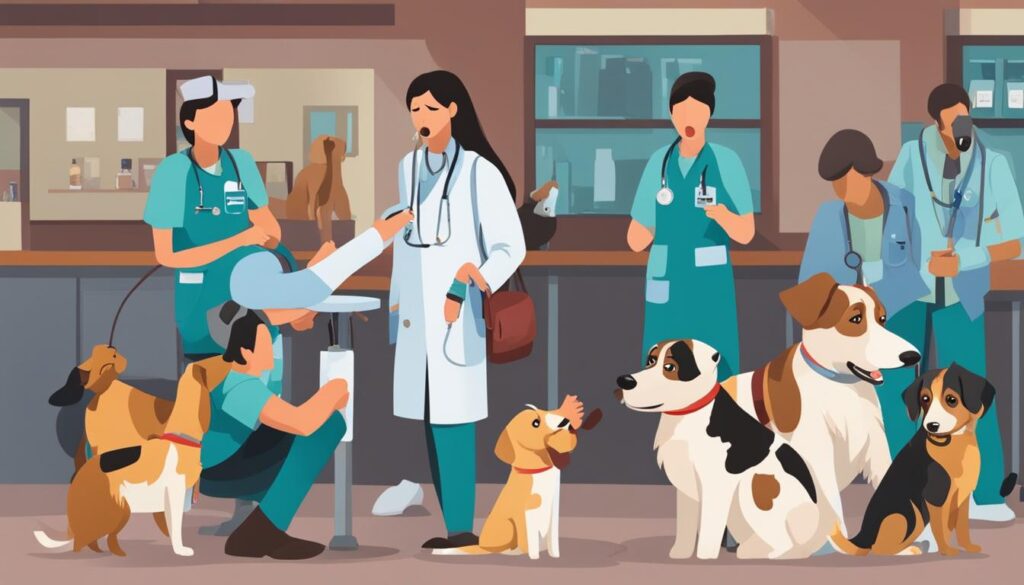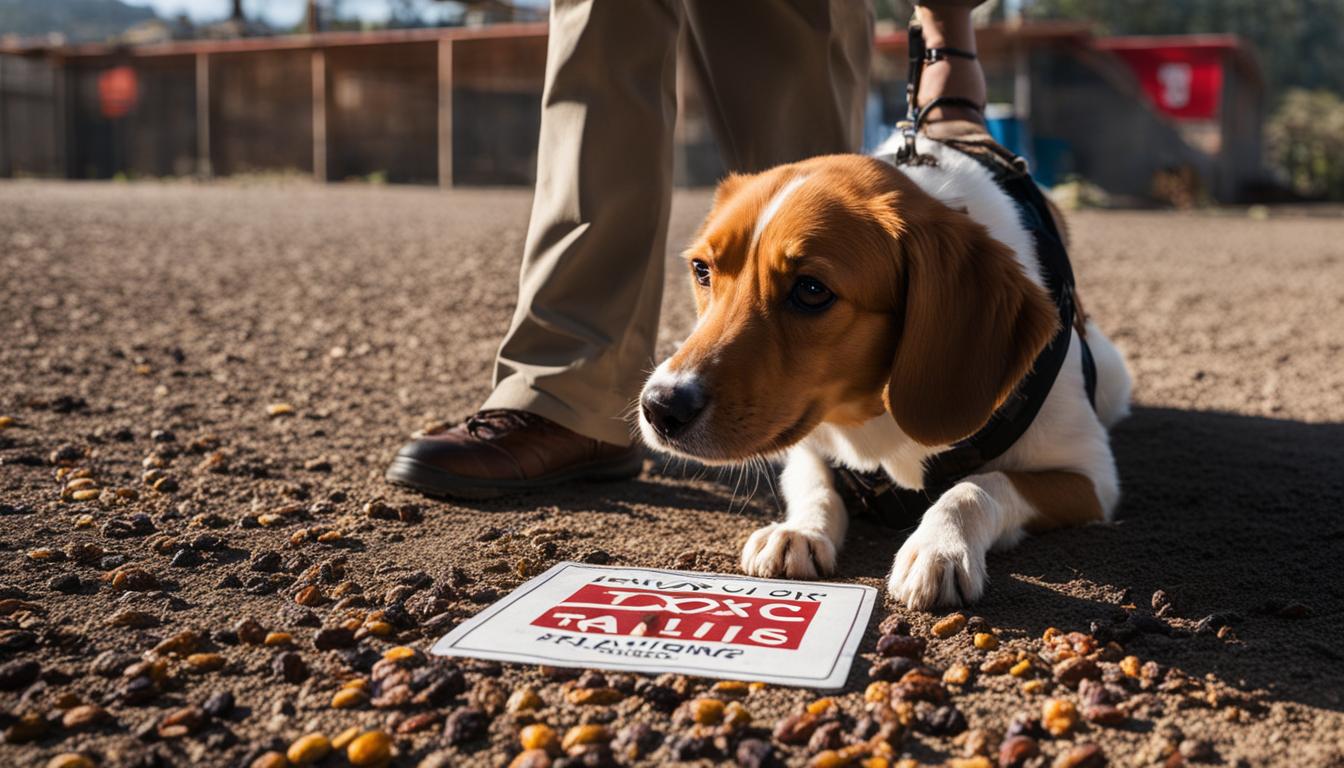Have you ever wondered if it’s safe for your furry friend to munch on a few raisins? Well, the truth is, raisins can pose a serious threat to dogs. In fact, they are highly toxic and can lead to severe health complications, including acute kidney failure. So, before you toss a grape or raisin to your pup, let’s explore the risks associated with raisin consumption by dogs.
Key Takeaways:
- Raisins and grapes are highly toxic to dogs and can cause serious health issues, including kidney failure.
- The exact reason why raisins are toxic to dogs is still unknown, but theories suggest the presence of mycotoxins or metabolic disturbances.
- If your dog ingests raisins, it’s essential to seek immediate veterinary care to increase their chances of recovery.
- Avoid feeding your dog raisins or grapes altogether and opt for safe alternatives like carrots or specifically-made raisin-free dog treats.
- Be cautious of foods that may contain raisins, such as certain brands of commercial dog food, and read labels carefully.
Why are Raisins Toxic to Dogs?
The exact reason why raisins are toxic to dogs is still unknown. However, there are several theories that aim to explain their toxicity levels. One theory suggests that the presence of mycotoxins (toxic molds or fungi) in raisins may be responsible. These mycotoxins can have harmful effects on dogs’ kidneys, leading to kidney damage or failure.
Another theory points to metabolic disturbances as a potential cause of raisin toxicity in dogs. It is believed that certain chemicals or compounds present in raisins can disrupt dogs’ normal metabolic processes, resulting in severe health complications.
Additionally, idiosyncratic reactions have also been considered as a possible explanation. This means that some dogs may have a unique sensitivity or intolerance to the components found in raisins, leading to adverse reactions and toxicity.
“The exact mechanism behind raisin toxicity in dogs remains unclear, and further research is needed to fully understand this phenomenon.” – Dr. Jane Carter, Veterinary Toxicologist

Raisin Toxicity Theories
| Theory | Description |
|---|---|
| Mycotoxins | The presence of toxic molds or fungi in raisins may lead to kidney damage or failure in dogs. |
| Metabolic disturbances | Chemicals or compounds in raisins can disrupt dogs’ normal metabolic processes, causing severe health complications. |
| Idiosyncratic reactions | Some dogs may have a unique sensitivity or intolerance to the components in raisins, resulting in adverse reactions and toxicity. |
Please note: While these theories provide insights into the potential reasons behind raisin toxicity in dogs, more research is needed to confirm their validity and better understand the underlying mechanisms.
Symptoms and Dangers of Raisin Poisoning in Dogs
If your dog consumes raisins, it is crucial to be aware of the symptoms that may indicate raisin poisoning. Within a few hours of ingestion, your dog may experience gastrointestinal irritation, leading to vomiting and potentially diarrhea. These initial symptoms may be followed by more serious signs of kidney failure within one to three days.
Signs of kidney failure in dogs can include loss of appetite, abdominal tenderness, fluid retention, tremors, weakness, excessive thirst, and decreased energy levels. It is important to note that raisin poisoning can affect dogs of any breed, gender, age, or size. If left untreated, raisin poisoning can be life-threatening for your furry companion.
To ensure the well-being of your dog, it is vital to seek immediate veterinary care if you suspect your dog has consumed raisins. Time is of the essence, as prompt intervention can increase the chances of a positive outcome. Early treatment may involve inducing vomiting or administering medications to prevent the further absorption of toxins. In severe cases, hospitalization, intravenous fluids, and intensive care may be necessary.
The Dangers of Raisin Poisoning in Dogs
The dangers of raisin poisoning in dogs should not be underestimated. Kidney failure is a serious condition that can have severe long-term consequences for your pet. The kidneys play a crucial role in filtering waste products from the blood, producing urine, and regulating the body’s fluid balance. When the kidneys fail to function properly, toxins can accumulate in the body, leading to further complications and potentially life-threatening conditions.
If you suspect your dog has ingested raisins or if you have witnessed any symptoms of raisin poisoning, it is essential to seek immediate veterinary care. Remember, early intervention can make a significant difference in the prognosis and overall well-being of your beloved canine companion.

Table: Common Symptoms of Raisin Poisoning in Dogs
| Symptoms | Description |
|---|---|
| Vomiting | Expelling the contents of the stomach forcefully through the mouth. |
| Diarrhea | Loose or liquid bowel movements. |
| Excessive thirst | Increased need for water beyond normal levels. |
| Loss of appetite | Decreased interest in food or refusal to eat. |
| Abdominal tenderness | Pain or discomfort in the abdominal area. |
| Fluid retention | Swelling or edema due to excess fluid accumulation in the body tissues. |
| Tremors | Involuntary shaking or quivering movements. |
| Weakness | Lack of strength or energy. |
It is crucial to remember that raisins are toxic to dogs and can cause serious health complications. Prevention is key when it comes to avoiding raisin poisoning. Be mindful of foods that may contain raisins, such as certain brands of commercial dog food, trail mixes, baked goods, and cereals. Always read labels carefully and opt for safe and healthy alternatives as treats for your dog, such as carrots, apples, or specifically-made raisin-free dog treats.
Can Dogs Recover from Raisin Poisoning?
If your dog has ingested raisins, prompt veterinary care is crucial to increase their chances of recovery. The course of treatment will depend on various factors, such as the amount of raisins consumed and the timeliness of intervention.
In less severe cases, inducing vomiting may be recommended to remove the raisins from your dog’s system. This can be done using a veterinarian-approved method. Additionally, your veterinarian may administer medications to prevent further absorption of toxins.
However, in more severe cases, hospitalization may be necessary. Dogs may require intravenous fluids to flush out the toxins and support kidney function. Intensive care, including monitoring and close observation, may also be provided. The prognosis for dogs with raisin poisoning depends on the individual circumstances and the effectiveness of the treatment.
| Treatment Options for Raisin Poisoning in Dogs | Effectiveness |
|---|---|
| Inducing vomiting | Can be effective if done early |
| Veterinarian-administered medications | Can help prevent further absorption of toxins |
| Hospitalization and intravenous fluids | Provides intensive care and supports kidney function |
Remember, if your dog consumes raisins, time is of the essence. Don’t hesitate to seek immediate veterinary care for the best chance of a successful recovery.
By taking swift action and following the guidance of your veterinarian, your dog has a better chance of recovering from raisin poisoning. Always prioritize your pet’s health and never hesitate to seek emergency care if you suspect raisin ingestion.

Prevention and Alternatives to Raisins for Dogs
When it comes to keeping your furry friend safe and healthy, it’s crucial to be aware of potential hazards in their diet. Raisins are one such hazard that all dog owners should be cautious of. Avoiding raisins altogether is the best way to prevent any risk of raisin poisoning in dogs. But what can you offer as safe alternatives? Here are a few options:
- Carrots: Carrots are a crunchy and healthy alternative to raisins. They are low in calories and packed with vitamins, making them a great snack for your pup. Just be sure to cut them into small, bite-sized pieces to make them easier for your dog to chew and digest.
- Apples: Apples are another excellent alternative to raisins. They contain essential nutrients and fiber that help support your dog’s overall health. Remember to remove the seeds and core before offering them to your dog, as these parts can be a choking hazard.
- Raisin-free dog treats: Many pet stores offer a variety of dog treats specifically made without raisins. These treats are a safe and convenient option for rewarding your pup without worrying about any potential risks.
It’s important to note that not all commercial dog foods are free from raisins. Some brands may include raisins as part of their recipes, so it’s crucial to read the labels carefully before purchasing. Look for dog foods that explicitly state they are raisin-free to ensure your pet’s safety.
“The safety and well-being of our furry friends should always be a top priority. By being mindful of what we feed them, we can help prevent any potential health risks. Opting for safe alternatives like carrots, apples, and raisin-free dog treats ensures that our dogs can enjoy delicious snacks without any harm.”
| Treat | Description |
|---|---|
| Carrots | Crunchy and low in calories, carrots are a healthy alternative packed with essential vitamins. |
| Apples | Apples provide essential nutrients and fiber, but remember to remove the seeds and core. |
| Raisin-Free Dog Treats | Specifically made without raisins, these treats offer a safe and convenient option for rewarding your pup. |
Emergency Care for Dogs Eating Raisins
If you suspect that your dog has eaten raisins, it is crucial to seek immediate veterinary care. Time is of the essence, and waiting for symptoms to appear can be risky. Although it may be tempting to try home remedies in the meantime, such as inducing vomiting with hydrogen peroxide, it is important to consult with a veterinarian before attempting any of these methods. The veterinarian will assess the situation, provide appropriate guidance, and take the necessary steps to ensure your dog’s well-being.
When you arrive at the veterinary clinic, be sure to inform the staff about the raisin consumption so they can prioritize your dog’s treatment. The veterinarian may choose to induce vomiting if it has been less than two hours since ingestion. This can help remove any remaining raisins from the stomach. They may also administer activated charcoal to absorb any toxins that have been absorbed into the bloodstream. Additionally, intravenous fluids may be given to support kidney function and flush out any toxins.
Remember, dogs who have ingested raisins may require close monitoring and specialized care to prevent complications. The veterinary team will closely observe your dog’s kidney function through blood tests and urine analysis. Treatment may also involve medications to manage symptoms and prevent further kidney damage. With proper and timely care, dogs have a higher chance of recovery and can go on to lead a happy and healthy life.
Things to Remember:
- If your dog has eaten raisins, seek immediate veterinary care.
- Do not wait for symptoms to appear before taking action.
- Avoid home remedies without consulting a veterinarian.
- Inform the veterinary staff about the raisin ingestion.
- Treatment may involve inducing vomiting, administering activated charcoal, and providing intravenous fluids.
- Close monitoring and specialized care are essential for dogs who have ingested raisins.
Raisins in Commercial Dog Food
If you’re a responsible dog owner, you know the importance of providing your furry friend with a balanced diet. However, it’s essential to be aware of the ingredients in commercial dog food, as some brands may include raisins. While raisins may seem harmless to humans, they can be highly toxic to dogs, potentially leading to serious health complications. To ensure your dog’s safety, it’s crucial to read labels carefully and avoid any products that contain raisins.
The Hidden Dangers of Raisins
Raisins, just like grapes, pose a significant risk to dogs due to their toxicity. While the exact reason behind raisin toxicity in dogs is still unknown, it’s crucial to understand the potential dangers. Consumption of raisins can lead to symptoms such as vomiting, diarrhea, excessive thirst, and even acute kidney failure. This can be life-threatening for dogs of any breed, age, or size. Therefore, it’s vital to be proactive and vigilant when it comes to the food you feed your beloved pet.
Choosing Safe Alternatives
To keep your dog healthy and happy, it’s wise to opt for safe alternatives to raisins in dog treats and commercial dog food. Carrots and apples, for example, are nutritious options that dogs often enjoy as tasty snacks. Additionally, there are specifically-made raisin-free dog treats available in the market, ensuring your pup can indulge in delicious treats without any risks. By choosing these alternatives, you can provide your furry friend with a nutritious diet while avoiding potential raisin poisoning.
When it comes to your dog’s well-being, it’s essential to prioritize their health and safety. By being aware of the ingredients in your dog’s food, actively reading labels, and opting for raisin-free alternatives, you can ensure that your furry companion remains healthy and protected from the dangers of raisins. Remember, a little precaution goes a long way in keeping your dog safe and happy.
Conclusion
So, can dogs eat raisins? Absolutely not! Raisins are extremely toxic to our furry friends and can have devastating effects on their health. If your dog accidentally consumes raisins, it is vital to act immediately to prevent any complications.
The risks of raisin consumption by dogs are significant, with the potential for acute kidney failure being one of the most alarming. That’s why it’s crucial to keep raisins and grapes out of your dog’s reach. Prevention is always better than cure, and in this case, it can save your dog’s life.
In the unfortunate event that your pup does eat raisins, don’t panic, but don’t wait for symptoms to appear either. Seek veterinary care right away to increase the chances of a successful recovery. Early intervention and appropriate treatment can make a world of difference in your dog’s outcome.
Remember, it’s essential to be cautious about the ingredients in your dog’s food as well. Even certain commercial dog food brands may include raisins, so always read the labels carefully. When in doubt, consult with your veterinarian for guidance on the best, raisin-free options to ensure your dog’s safety and well-being.
FAQ
Can dogs eat raisins?
No, raisins are highly toxic to dogs and can lead to serious health complications.
Are raisins toxic to dogs?
Yes, both grapes and raisins are toxic to dogs and can cause acute kidney failure.
Why are raisins toxic to dogs?
The exact reason is still unknown, but theories include the presence of mycotoxins, metabolic disturbances, or idiosyncratic reactions.
What are the symptoms and dangers of raisin poisoning in dogs?
Symptoms can include vomiting, diarrhea, excessive thirst, and signs of kidney failure. Raisin poisoning can be life-threatening if not treated promptly.
Can dogs recover from raisin poisoning?
With prompt veterinary care, dogs have a higher chance of recovery. Treatment may include inducing vomiting or administering medications to prevent further toxin absorption.
How can I prevent raisin poisoning in my dog?
Avoid feeding your dog raisins or grapes altogether and be cautious of foods that may contain raisins. Opt for safe alternatives like carrots or raisin-free dog treats.
What should I do if my dog eats raisins?
Seek immediate veterinary care. Time is of the essence. If emergency care is inaccessible, consult with a veterinarian before attempting to induce vomiting.
Are there raisins in commercial dog food?
It is crucial to read labels carefully, as some brands may include raisins in their recipes. Consult with your veterinarian if you have concerns about the ingredients in your dog’s food.





